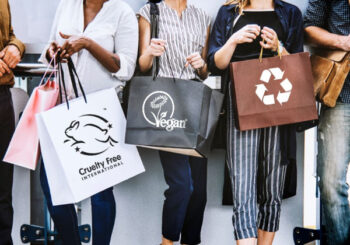By Jane Marsh
Guest Writer for Wake Up World
Worldwide, people realize how consumerism is a major player in the climate crisis. Frequent Amazon packages used to deliver a rush of dopamine, but now they are a constant reminder of the planet’s failing health.
[pro_ad_display_adzone id=”110028″]
Catalyzed by the COVID-19 pandemic and the rise of fast fashion sites like Shein or e-commerce giants like Temu, buyers are rapidly changing their habits to take action against unfair labor practices and unethical environmental treatment. How is this manifesting in shoppers, and is it making the impact everyone hopes for?
Expectations for Transparency
The customer journey is more complex than ever, as product comparisons and reviews incite decision fatigue for even the simplest groceries. Why is this happening? Information access and a greater desire for corporate transparency fuel 82% of consumers hoping to support entities that align with their values.
People search numerous places to find these answers, including websites and social media. Shoppers want detailed disclosure concerning:
- Supply chains
- Labor rights and worker treatment
- Diversity, equity and inclusion
- Raw material sourcing
- Environmental, social and governance goals
- Waste reduction
- Transition to renewable energy
- Carbon footprints
- Water use
- Pricing justification
- Commitments to worldwide sustainable recommendations and benchmarks
Shoppers also want clarity. Countless sustainability terms, such as “environmentally friendly” and “all-natural,” are not regulated. Mixed publicity and greenwashing claims over these terms confuse consumers. People want companies only to label ethical packaging with eco-friendly words with third-party backing.
Overcoming Distrust
Sustainably minded consumers also have a healthy dose of skepticism. Shoppers no longer trust companies to be completely honest, especially after repeated transparency failures. It has made many shoppers give up on trying when voting with your dollar has never been more important.
Culture must change how sustainability concepts impact buyers into something more positive, otherwise corporations engaging in genuine efforts won’t get the limelight and support they deserve. There are plenty of businesses out there innovating to make all of these business aspects more sustainable, including:
- Packaging
- Advertising
- Tech use
- Political advocacy
- Circular economic practices and take-back programs
Investing in sustainability from a corporate perspective is a lot of time and money. If that goes to waste, then they will revert to unethical operations. In an ideal world, companies would default to sustainable options. In a hyperconsumerist society, unnecessary burdens are on buyers to convince companies how they should perform to keep their bottom line happy.
The “No-First” Mindset
Some consumers want to focus on shopping from ethical retailers. Another impact sustainability has on buyers is making them want to buy less or stop shopping altogether. Handfuls of videos get uploaded to YouTube and TikTok yearly, detailing household plans to undergo a “no-buy” year to get a grip on their finances and environmental impact.
Consumers are trying to build new habits. Instead of defaulting to yes on a purchase, they shift to no first. People want to resist the urge and short-term happiness an impulse purchase brings and choose thoughtfulness and consideration instead. Do they really want that item, or is it just trendy or well-advertised?
This trend has fascinating impacts, from making people more self-reliant by self-educating how to take care of home water damage to growing their own food and foraging. DIY is more popular as people create rather than consume. Though fashion hauls still run rampant online, it is more likely than ever that someone will try sewing and mending their clothes rather than filming a video about what they bought.
Social Media Advocacy
Sustainability has changed consumers by making them more vocal online. People will call out companies that lie about their green commitments or if they aren’t doing enough to help the planet. Social media is pivotal to an organization’s success nowadays, and one viral video could make or break a reputation. Consumers are more willing to expose corporations of malpractice in the name of social justice, hoping it will instigate widespread change.
Additionally, it raises awareness and conversations about environmental issues people may have never seen before seeing that post. It is easier than ever for a post or video to become viral, so consumers are using their platforms to try to send positive messages — to other shoppers and companies.
[pro_ad_display_adzone id=”110030″]
Since this information is seen by so many, it solidifies widespread mutual understanding as a sustainable consumer, such as learning why ethical products cost more or considering shopping secondhand before buying new.
Consumers Have an Opportunity to Revolutionize
Companies fail without frequent shoppers, and people are starting to realize they have the power to determine the fate of a massive enterprise. A hashtag can start a boycott, and an influencer’s outcry may lead to regulatory change — all because consumers see their purchases in a new light. Corporations that don’t get the heads up about this mindset shift will lose relevance and brand loyalty until they can’t stay afloat to harm the planet anymore.
About the author:
 Jane is the founder and editor-in-chief of Environment.co where she shares practical tips on how to live a greener life.
Jane is the founder and editor-in-chief of Environment.co where she shares practical tips on how to live a greener life.
[pro_ad_display_adzone id=”110027″]







